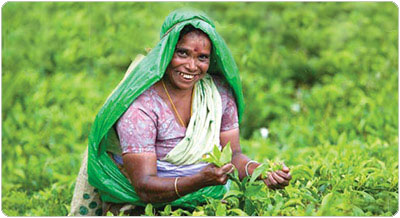Bright prospects for plantation community
By P. Krishnaswamy

In the last five years, since President
Mahinda Rajapaksa assumed office as the Head of the State, several
special programs and projects were formulated and implemented by the
Government for the socio-economic uplift of the impoverished plantation
community. These programs were earlier implemented mainly by the Nation
Building and Estate Infrastructure Development Ministry, under the
previous Cabinet, and are presently being implemented by the Economic
Development Ministry.
The far-reaching projects and programs were aimed at mainstreaming
the plantation community, which remained politically isolated, and
providing them with better housing, infrastructure, health, education,
employment and vocational training facilities. The progress made so far
under these ongoing projects and programs include 15,000
independent/twin housing units at a cost of about one billion rupees, of
the total 50,000 housing units envisaged under the program; road
development at a cost of Rs. 1,400 m; power supply to 150 estates at a
cost of Rs. 150 m which benefited 16,000 families; water supply projects
at a cost of Rs. 65 m which benefited 10,000 families;
reconstruction/rehabilitation of 500 schools at a cost of Rs. 725 m; 40
healthcare projects at Rs. 30 m and 40 socio-cultural projects at Rs. 65
m.
The National Action Plan for the Social Development of the Plantation
Community, costing a total of Rs. 100 billion, is the product of a
collective effort by a large number of stakeholders who are committed to
the well-being of Sri Lanka in general and the plantation sector in
particular. The overall goal of the action plan is to contribute to
poverty reduction and social and economic development of the plantation
community as a priority for the achievement of the Millennium
Development Goals under the Mahinda Chinthana. The Action Plan is
anticipated to be fully implemented in the years 2011-2015.
The Government of India has undertaken to build 140 modern medical
wards to the Glencon Hospital in Dickoya for the benefit of the
plantation community and also to construct 6000 houses in the two
plantation districts of Nuwara Eliya and Badulla. This is in addition to
India's donation of 40 buses for operating transport services in remote
plantation areas, especially for the benefit of schoolchildren.
The Thondaman Foundation is providing vocational training to about
1000 students every year in 15 trades. Janasakthi Centres established by
the Ceylon Workers' Congress at 45 locations throughout the plantation
areas are providing IT training to about 10,000 children every year with
the objective of making the plantation youth employable in the State and
private sectors.
Living conditions
Some of the major ongoing development projects implemented in the
Nuwara Eliya district for improving the living conditions of the
community and the rural population include the Upper Kotmale Hydro Power
Project (UKHP), the Gama Neguma Jathika Saviya Program, the Gama Neguma
Program and the Second Community Water Supply and Healthcare Project.
All these programs were implemented under the 'Mahinda Chinthana' during
the last five years.
Much headway has been made under the ongoing development programs to
improve transport, roads and electricity supply. The country's longest
road tunnel - 225 metres - at Ramboda on the Gampola-Nuwara Eliya
highway, built at a cost of Rs. 2000 million was opened by President
Mahinda Rajapaksa in February 2008. The tunnel, which is part of the
renovated and expanded road network, has helped streamline
transportation between Nuwara Eliya, Kandy, Colombo and beyond.
During the last four years, the Government has spent more than Rs.7.5
million to uplift agriculture and to renovate irrigation facilities in
the district. During the period Rs.32 million has been spent on
improving local water facilities in the district and Rs.2,934 million
has been allocated for improving water facilities to townships in the
district.
New teaching appointments were given to over 3000 educated plantation
youth and a bulk of the beneficiaries were from the Nuwara Eliya
district. Measures were initiated to improve educational facilities to
children of the plantation community. State sector employment as Grama
Niladharis, postal workers and communication facilitators were also
given to educated youth of the community.
Estate hospitals
Over 70 estate hospitals have been taken over by the Government in an
effort to improve the overall health facilities of the plantation
workers and the amount spent on such projects during the last four years
is Rs.225 million. For the first time 165 estate youth were trained as
nurses in the College of Nursing at Batticaloa.
The 'Diriya Piyasa' housing program, the Nuwara Eliya town
beautification program, the new Government Secretariat building program
and other programs to provide better infrastructure and administrative
facilities were also introduced during the period.
Since 2005 the Government has spent over Rs.3 billion for improving
dairy farming in the district in an effort to enhance the income of
dairy farmers and to make the country self-sufficient in milk and dairy
products. |

